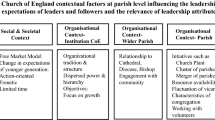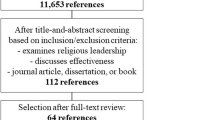Abstract
Interviews were conducted with 101 senior pastoral leaders from a variety of denominations in order to identify the ways in which pastors and those in authority positions over senior pastoral leaders measure their own effectiveness. The findings of these interviews revealed 23 measures of effectiveness in five categories, including leader outcomes, congregational outcomes, and objective outcomes. Based on the effectiveness taxonomy described in the current study, a process is suggested for a preliminary discussion among church leadership teams, congregational boards, and denominations to identify their primary mission, constituencies served, and related effectiveness priorities.
Similar content being viewed by others
References
Kling, F. R. (1958). A study of testing as related to the ministry. Religious Education, 53, 243–248.
Krippendorf, K. (2004). Content analysis: An introduction to its methodology. Thousand Oaks, CA: Sage.
Kuhne, G. W., & Donaldson, J. F. (1995). Balancing ministry and management: An exploratory study of pastoral work activities. Review of Religious Research, 37, 147–163.
Lichtman, S. L., & Malony, H. N. (1990). Effective ministerial style as perceived by denominational leadership. Pastoral Psychology, 38, 161–171.
Malony, H. N. (1984). Ministerial effectiveness: A review of recent research. Pastoral Psychology, 33, 96–104.
McCall, M. W., Lombardo, M. M., & Morrison, A. M. (1988). The lessons of experience: How successful executives develop on the job. Lexington, MA: Lexington Books.
McKenna, R. B., Boyd, T. N., & Yost, P. R. (2007a). Learning agility in clergy: Understanding the personal strategies and situational factors that enable pastors to learn from experience. Journal of Psychology & Theology, 35, 190–201.
McKenna, R. B., Yost, P. R., & Boyd, T. N. (2007b). Leadership development and clergy understanding: The events and lessons that shape pastoral leaders. Journal of Psychology & Theology, 35(3), 179–189.
Meek, K. R., McMinn, M. R., Brower, C. M., Burnett, T. D., McRay, B. W., Ramey, M. L., et al. (2003). Maintaining personal resiliency: Lessons learned from evangelical protestant clergy. Journal of Psychology and Theology, 31, 339–347.
Nauss, A. (1983). Seven profiles of effective ministers. Review of Religious Research, 24, 334–346.
Nauss, A. (1989). Leadership styles of effective ministry. Journal of Psychology & Theology, 17, 59–67.
Nauss, A. (1994). Ministerial effectiveness in ten functions. Review of Religious Research, 36, 58–69.
Nauss, A. (1995). The pastor as leader: Shepherd, rancher, or . . .? Journal of Psychology and Theology, 23, 115–128.
Nauta, R. (1988). Task performance and attributional biases in the ministry. Journal for the Scientific Study of Religion, 27, 609–620.
Senske, K. (2004). Pastor: CEO and role model. Clergy Journal, 80(8), 3–6.
Author information
Authors and Affiliations
Corresponding author
Rights and permissions
About this article
Cite this article
McKenna, R.B., Eckard, K. Evaluating Pastoral Effectiveness: To Measure or Not to Measure. Pastoral Psychol 58, 303–313 (2009). https://doi.org/10.1007/s11089-008-0191-5
Received:
Accepted:
Published:
Issue Date:
DOI: https://doi.org/10.1007/s11089-008-0191-5




